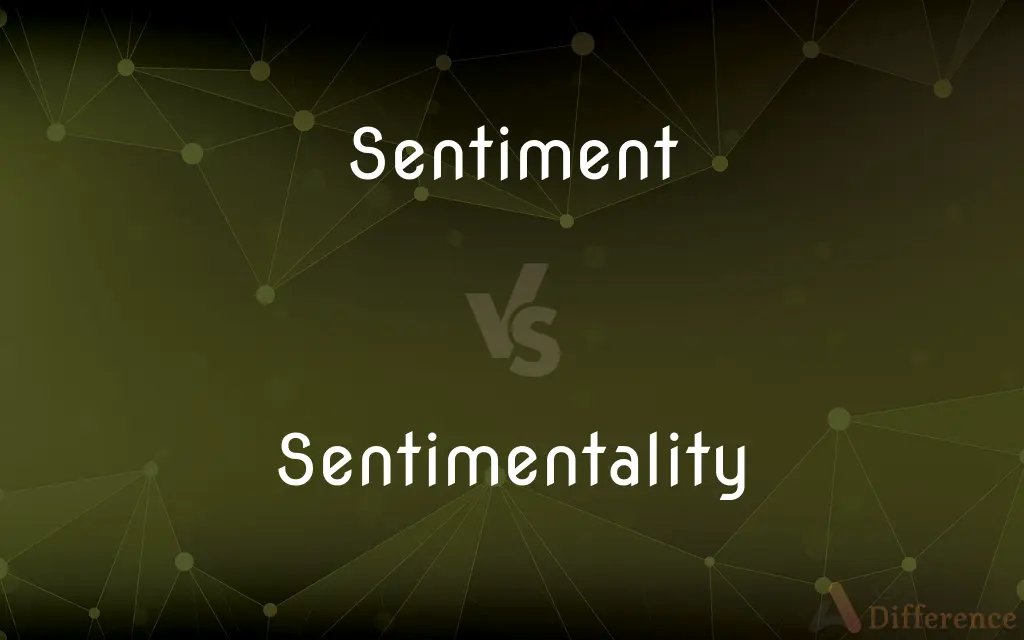Sentiment vs. Sentimentality — What's the Difference?
By Fiza Rafique & Urooj Arif — Updated on April 6, 2024
Sentiment is a general attitude or feeling, whereas sentimentality refers to the excessive expression of sentiments, often perceived as mawkish or overly emotional.

Difference Between Sentiment and Sentimentality
Table of Contents
ADVERTISEMENT
Key Differences
Sentiment involves general feelings or attitudes toward something, focusing on the emotional aspect of opinions or reactions. For example, one might have a positive sentiment towards a new policy due to its benefits. On the other hand, sentimentality goes a step further by evoking or expressing these feelings in an excessive, sometimes overly emotional or maudlin way. This can involve a display of tender, nostalgic, or melancholic emotions that seem disproportionate to the situation.
While sentiment can be subtle and nuanced, encapsulating a broad range of emotions from approval to disapproval without necessarily being overt or expressive, sentimentality is often characterized by its lack of subtlety. It tends to be overt, demonstrative, and can sometimes be viewed as lacking in genuine depth due to its exaggerated nature.
Sentiment can play a significant role in shaping one's perceptions and decisions in a more understated manner. For instance, a person's sentiment towards environmental conservation can influence their behaviors and choices subtly over time. Conversely, sentimentality may lead to more immediate, visible reactions, such as tearfulness during a particularly nostalgic film scene, highlighting a direct and often immediate expression of emotional response.
In literature and art, sentiment is appreciated for its ability to convey genuine emotions and connect with the audience on a deeper level. It allows for an emotional resonance that is sophisticated and reflective. Sentimentality, while also seeking to connect emotionally, can sometimes be criticized for appealing to easy or superficial emotions, potentially overshadowing more complex or nuanced expressions.
A balance between sentiment and sentimentality is often sought in creative works to evoke a strong emotional response without crossing into the realm of the overly sentimental, which might detract from the work's impact or authenticity.
ADVERTISEMENT
Comparison Chart
Definition
A general feeling or attitude towards something.
An excessive or overly emotional expression of feelings.
Perception
Can be subtle and nuanced.
Often viewed as exaggerated or mawkish.
Expression
Not necessarily overt or expressive.
Overtly demonstrative, sometimes lacking genuine depth.
Role in Decision Making
Influences perceptions and decisions subtly.
Leads to immediate, visible emotional reactions.
Impact in Arts
Valued for conveying genuine emotions and connecting deeply.
Can be criticized for overshadowing complex expressions with superficial emotions.
Compare with Definitions
Sentiment
Feeling or Emotion.
The sentiment of joy was palpable in the air after the team's victory.
Sentimentality
Nostalgia or Melancholy.
She has a sentimentality for old love songs that remind her of her youth.
Sentiment
Opinion or Attitude.
Her sentiments on the new policy were largely positive, appreciating its focus on sustainability.
Sentimentality
Excessive Emotion.
The movie's sentimentality, with its tearful reunions, felt a bit overdone.
Sentiment
Subtle Expression.
His letter conveyed a sentiment of longing without directly stating it.
Sentimentality
Emotional Appeal.
The advertisement used sentimentality to connect with viewers, showcasing family moments.
Sentiment
General Mood.
The sentiment at the workplace improved significantly after the announcement of bonuses.
Sentimentality
Mawkishness.
Critics often dismiss certain books as being full of sentimentality, lacking depth.
Sentiment
Emotional Resonance.
The movie captured the sentiment of the era with remarkable accuracy.
Sentimentality
Overly Emotional Expression.
His speech was filled with sentimentality, aiming to tug at the audience's heartstrings.
Sentiment
A thought, view, or attitude, especially one based mainly on emotion instead of reason
An anti-American sentiment swept through the country.
Sentimentality
Sentimentality originally indicated the reliance on feelings as a guide to truth, but in current usage the term commonly connotes a reliance on shallow, uncomplicated emotions at the expense of reason.Sentimentalism in philosophy is a view in meta-ethics according to which morality is somehow grounded in moral sentiments or emotions. Sentimentalism in literature refers to techniques a writer employs to induce a tender emotional response disproportionate to the situation at hand (and thus to substitute heightened and generally uncritical feeling for normal ethical and intellectual judgments).
Sentiment
Emotion; feeling
Different forms of music convey different kinds of sentiment.
Sentimentality
The quality or condition of being sentimental, especially excessively or extravagantly so.
Sentiment
Tender or romantic feeling
Felt strong sentiment for each other.
Sentimentality
A sentimental idea or an expression of it.
Sentiment
Maudlin emotion; sentimentality
"He called her 'beloved madame,' and many other endearments, delivered with gallant mushiness, irony damascened with sentiment" (Robert D. Richardson).
Sentimentality
An act or state of being sentimental.
Sentiment
The thought or emotion that underlies a remark or gesture
The child's gift was ridiculous, but the sentiment behind it moved the mother to tears.
Sentimentality
The quality or state of being sentimental.
Sentiment
The expression of delicate and sensitive feeling, especially in art and literature.
Sentimentality
Falsely emotional in a maudlin way
Sentiment
A general thought, feeling, or sense.
The sentiment emerged that we were acting too soon.
Sentimentality
Extravagant or affected feeling or emotion
Sentiment
(uncountable) Feelings, especially tender feelings, as apart from reason or judgment, or of a weak or foolish kind.
Sentiment
A thought prompted by passion or feeling; a state of mind in view of some subject; feeling toward or respecting some person or thing; disposition prompting to action or expression.
The word sentiment, agreeably to the use made of it by our best English writers, expresses, in my own opinion very happily, those complex determinations of the mind which result from the coöperation of our rational powers and of our moral feelings.
Alike to council or the assembly came,With equal souls and sentiments the same.
Sentiment
Hence, generally, a decision of the mind formed by deliberation or reasoning; thought; opinion; notion; judgment; as, to express one's sentiments on a subject.
Sentiments of philosophers about the perception of external objects.
Sentiment, as here and elsewhere employed by Reid in the meaning of opinion (sententia), is not to be imitated.
Sentiment
A sentence, or passage, considered as the expression of a thought; a maxim; a saying; a toast.
Sentiment
Sensibility; feeling; tender susceptibility.
Mr. Hume sometimes employs (after the manner of the French metaphysicians) sentiment as synonymous with feeling; a use of the word quite unprecedented in our tongue.
Less of sentiment than sense.
Sentiment
Tender, romantic, or nostalgic feeling or emotion
Sentiment
A personal belief or judgment that is not founded on proof or certainty;
My opinion differs from yours
What are your thoughts on Haiti?
Common Curiosities
What is sentimentality?
Sentimentality is the excessive or overly emotional expression of sentiments.
What is sentiment?
Sentiment refers to a general feeling, emotion, or attitude toward something.
Is sentimentality always a negative trait?
Not necessarily; it can be appreciated in certain contexts where an emotional appeal is effective, but it's often criticized for lacking depth.
How do sentiment and sentimentality differ in expression?
Sentiment can be nuanced and subtle, whereas sentimentality is overt and exaggerated.
How do sentiments affect our perceptions?
Sentiments shape our perceptions by coloring our attitudes and feelings towards various subjects or situations.
Can a piece of art be both sentimental and have depth?
Yes, if it balances genuine emotional expression with depth and nuance, avoiding excessive sentimentality.
Can sentiment be positive or negative?
Yes, sentiment can be either positive or negative, depending on the attitude or feeling involved.
How does sentiment influence decision-making?
Sentiment subtly influences one's perceptions and decisions through emotional resonance or attitudes.
What role does sentimentality play in arts?
Sentimentality aims to evoke strong emotional responses but can be criticized for overshadowing nuanced expressions with superficial emotions.
Does sentiment play a role in business decisions?
Yes, business decisions can be influenced by sentiment, especially in branding and customer relations.
How do sentiments evolve over time?
Sentiments can evolve with experiences, cultural shifts, and changes in personal or societal values.
Is sentimentality harmful?
It's not inherently harmful but can be limiting if it overshadows more complex or genuine emotional expressions.
Why is sentimentality viewed negatively in literature?
Because it's often seen as appealing to simple, easy emotions at the expense of depth and complexity.
How can one identify sentimentality?
By its excessive emotional appeal, often lacking subtlety and perceived as insincere or superficial.
Is it possible to express sentiment without being sentimental?
Yes, expressing sentiment in a nuanced and genuine way without resorting to exaggerated emotional expressions is possible.
Share Your Discovery

Previous Comparison
Cyclic vs. Cyclical
Next Comparison
Cave vs. GrottoAuthor Spotlight
Written by
Fiza RafiqueFiza Rafique is a skilled content writer at AskDifference.com, where she meticulously refines and enhances written pieces. Drawing from her vast editorial expertise, Fiza ensures clarity, accuracy, and precision in every article. Passionate about language, she continually seeks to elevate the quality of content for readers worldwide.
Co-written by
Urooj ArifUrooj is a skilled content writer at Ask Difference, known for her exceptional ability to simplify complex topics into engaging and informative content. With a passion for research and a flair for clear, concise writing, she consistently delivers articles that resonate with our diverse audience.













































